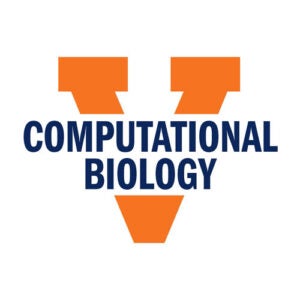 In July of 2017, Nathan Sheffield, PhD (then Assistant Professor of Public Health Sciences and resident member of the Center for Public Health Genomics) and Janet Cross, PhD (then Assistant Dean for Graduate Research and Training) sat down over coffee to discuss the potential development of a new PhD program in Computational Biology. Fast forward nearly seven years, two title changes and one global pandemic and the School of Medicine Biomedical Sciences Graduate Programs now include a ninth degree-granting program in Computational Biology. Dr. Sheffield, currently an Associate Professor, and Dr. Cross, who has served as the Associate Dean for the Graduate and Medical Scientist Programs since June of 2020, received word last week that the program was approved by the State Council on Higher Education for Virginia (SCHEV) after an external peer review.
In July of 2017, Nathan Sheffield, PhD (then Assistant Professor of Public Health Sciences and resident member of the Center for Public Health Genomics) and Janet Cross, PhD (then Assistant Dean for Graduate Research and Training) sat down over coffee to discuss the potential development of a new PhD program in Computational Biology. Fast forward nearly seven years, two title changes and one global pandemic and the School of Medicine Biomedical Sciences Graduate Programs now include a ninth degree-granting program in Computational Biology. Dr. Sheffield, currently an Associate Professor, and Dr. Cross, who has served as the Associate Dean for the Graduate and Medical Scientist Programs since June of 2020, received word last week that the program was approved by the State Council on Higher Education for Virginia (SCHEV) after an external peer review.
Computational biology is an interdisciplinary field that centers on the development and application of computational methods to analyze large collections of biological data, such as genetic sequences, cell populations or protein samples, to make new predictions or discover new biology. The computational approaches used include analytical methods, mathematical modeling and simulation. The shift toward more quantitative approaches to biological research and experimentation is driving demand for expert computational biologists who can manage, analyze and interpret large sets of biological data. Our new degree program will address this need by training computational biologists who are prepared to develop and apply sophisticated computational approaches to key biological and biomedical questions in academia and industry. The proposed PhD program will equip students with the knowledge and skills to conduct advanced analysis of large data sets. Students will also gain an in-depth understanding of the biology behind the data they are analyzing and will learn to apply computational approaches such as algorithms and statistical models that are commonly used across biological fields. Importantly, the students will learn and apply the principles of open science – transparency, scientific reproducibility, data sharing and collaborative research. Graduates will be able to identify areas for future research and contribute to research teams to drive discovery and innovation in the biological sciences in both the public and private sector.
Now that the official SCHEV approval letter is safely in hand, Dr. Sheffield is preparing to assume his role as the inaugural Director of Graduate Studies for the UVA SOM Computational Biology PhD program. He will work with many others who will be involved in the work of bringing the program to life. This will require continuing to build new coursework, recruiting faculty mentors for trainees and, of course, marketing the opportunity to the next generation of students seeking a PhD in Computational Biology!
Many thanks go to all of the individuals who helped with this effort at any point throughout the very long process of shepherding this proposal through the approval process – it took a village!
Tags: Computational Biology, CPHG, Nathan Sheffield

Comments